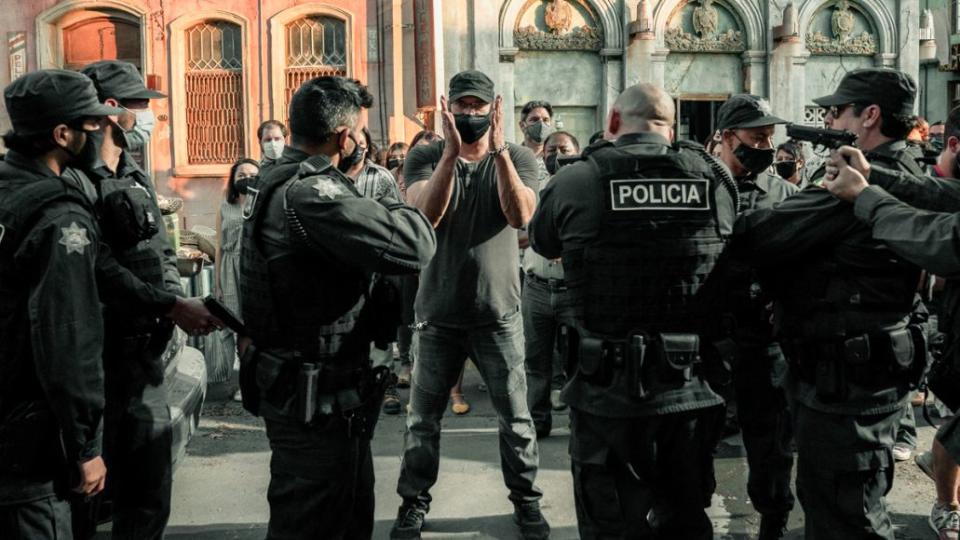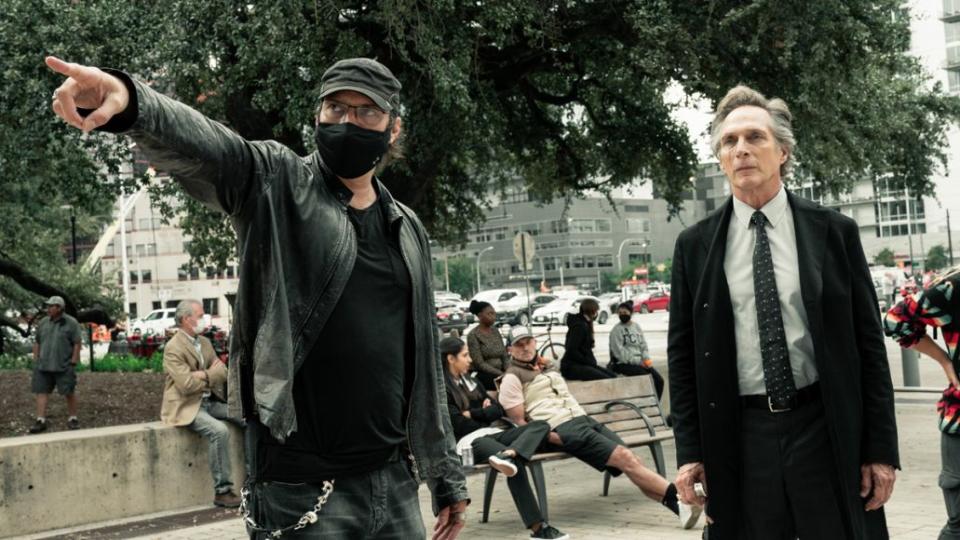Robert Rodriguez (and Sons) Explain How Movies Like Hypnotic Are the Family Business
- Oops!Something went wrong.Please try again later.
The post Robert Rodriguez (and Sons) Explain How Movies Like Hypnotic Are the Family Business appeared first on Consequence.
At one point during our Zoom conversation about film, family, and the Ben Affleck-starring Hypnotic, director Robert Rodriguez and I briefly debate the definition of “boot-strapping.”
Robert broke out as an indie film director in the early 1990s, when his debut feature film won the Grand Jury Prize at the 1993 Sundance Film Festival amongst other awards; El Mariachi was famously made for just $7,225 — a budget Rodriguez in part earned the money for by participating in a drug-testing study.
Today, Robert has built his own studio in Austin, Texas, where he gets to make the movies he wants on his terms. And working there with him are many of his children, including co-writer and producer Racer Max Rodriguez and composer Rebel Rodriguez, who began working on Robert’s films at a very early age, and joined their father to discuss life as a member of the Rodriguez family business: making movies.
Racer and Rebel don’t hesitate to say how much they enjoy it. “We realized we wouldn’t want to do this on our own or without family,” Racer says. “Because for us there’s the pressure of, ‘Oh, well, you do it because it’s your dad, and he’s a filmmaker, and he got you into it so you’re scared to step outside of it.’ And it’s like, ‘No, we don’t.’ He would be the first to kick us out of the door if we had the desire to go do it. But, to us, this is just family time, and there’s no one else I’d rather work with than family.
To some, working on their father’s films might not be seen as bootstrapping — certainly, neither Racer or Rebel had to sign up for medical experiments to make their first feature film. But Robert says that for one thing, the drug trial was “my own choice. I could have just borrowed from my grandparents like most people did. But I wanted it to be my own risk.”
And for another, being a part of the Rodriguez filmmaking machine has been an exciting part of his sons’ lives, but not always an easy one — such as the shoot for 2005’s The Adventures of Sharkboy and Lavagirl in 3-D, based on a story by Racer (who was eight years old at the time of the film’s release), and also featuring Racer and Rebel as younger versions of the film’s titular Sharkboy.

Behind the scenes of Hypnotic (Ketchup Entertainment)
“I remember when [Rebel] was doing Sharkboy, he was like five years old. I had him up on a wire and we’re blowing cold air on him — that’s all it was, it was just air-conditioned air,” Robert says. “Of course, he didn’t want to work on a movie. He didn’t know what a movie was. And he is being strung up and he says, ‘How come I have to do my own stunts?’ I said, ‘Well, it’s a family business. I mean, you’re the actor and there’s no stunt kids. If this was a restaurant, you’d have to be sweeping the floor. But this is the family business. You have to do it.'”
Continues Robert, “So they definitely worked their way up doing the hard jobs and the not-so-fun jobs, being the stunt kids a lot of the times and taking hard knocks. But they grew up seeing their lives being borrowed and put into these stories — everything we were doing would inspire me. So they felt like, yeah, these are our projects too. My dad’s using our lives in the movies, so we should be a part of these projects.”
Now grown up, Rebel has composed the scores for Robert’s Red 11 and We Can Be Heroes, and enjoys being a part of the process from the beginning. “In a normal movie, the composer comes after the movie’s done, basically,” he says. “One answer to that is if you want to write great scores, you should go write for great movies. But that’s one angle. For me, all I thought was, well, I would just want to help build up incredible movies here, so I can just write incredible scores here. So now I’m invested in learning how to help them come up with ideas in the early part of production and writing stage and just make the best movies we can. I’d prefer to be here, and build this up to the levels that I dream of and want to achieve.”
Robert says that if Rebel started working for other filmmakers as a composer, he’d take on the composing work himself (as he’s done for most of his films since 2001’s Spy Kids). But he’s full of praise for Rebel as a composer. “He did so good on his music writing that I couldn’t even help him anymore. He is so beyond my abilities. I said, ‘I never learned music theory.’ I said, ‘How did you learn music theory?’ He said, ‘Oh, on YouTube.’ I was like, ‘Wow, why didn’t I think of that?’ He writes way beyond my ability — he just smoked me. So I assist him. I do music editing for him.”
Hypnotic is the latest family collaboration, a tight thriller about a detective (Affleck) whose search for his missing daughter brings him to an even bigger mystery involving “hypnotics” — people with the ability to control the minds of others.
Robert says that the genesis of the idea began while he was editing 2002’s Spy Kids 2: “I have a lot of movies playing on the side while I edit because when the computer would take a long time to render, I would just look over at a movie that I knew.”
At one point, the movie playing was Vertigo, which led Robert to the idea of making a movie like the Alfred Hitchcock classic, because he “always liked [Hitchcock’s] one-word titles, and movies that just had lots of twists and turns and very energetic scores, with a big leading man actor like Cary Grant or Jimmy Stewart.”
As he reflects, “There’s a lot of craftsmanship that goes in it — a lot of $2 editing and camera tricks to make the audience believe what they’re looking at. That’s my cup of tea. Because I love doing all those aspects of a movie. I wondered what one-word title [Hitchcock] would’ve come up with if he had kept making movies beyond his career. And then it just came to me right away — Hypnotic. And I thought, ‘Hmm, that’s cool, but what does it mean?’ And then I thought, and then 10 minutes later I was like, ‘Oh, it’s a guy who can’t be caught.'”
Robert wrote most of a first draft “really quickly” at the time, but then put it aside to focus on other projects. 15 years later, though, he decided to revisit it, finally completing a first full script in 2017. Hypnotic’s long stretch on the back burner meant that this was a story both Racer and Rebel grew up hearing about.
“I was five years old when he first created it,” Racer says. “He’d always give us whispers of his projects over the years and we’d hear the title and the basic idea. Like, ‘Oh, Hypnotic, oh that’s pretty cool. When’s that going to happen?’ And he’s, ‘Someday it’ll happen, eventually.’ He kept holding onto that idea, and fast-forward, the next time I hear about Hypnotic, I’m working with him as an adult now, as co-writer, co-producer, and it’s a script he’s putting in my hands and going, ‘Hey, could you help put this together so we can film it now? Let’s make it happen.’ It’s crazy.”
Adds Rebel, “It really developed a mythical status. Because we’d just hear whispers of it. The title always just made you think, even though we didn’t know too much about the story. We were just, ‘Hypnotic, okay.'”
Hypnotic was largely shot at Robert’s Austin studio, at times using the set from 2019’s Alita Battle Angel, which Robert kept after production. “I’ve had this place 20 years, almost as long as I’ve had this movie idea in my head. If you were to come visit the studio, we’d give you the Hypnotic tour and you’d see how we used every inch of this place,” he says.

Behind the scenes of Hypnotic (Ketchup Entertainment)
Robert then proceeds to list every major location used in the film, from a bank to an office to rural Mexico, and where it was shot on his property. “Everything was shot very claustrophobically right here,” he continues. “One, for budgetary reasons and Covid reasons, but also it helped the story.”
Hypnotic definitely ends on a note that sets up a potential continuation, and Robert confirms that “we’ve been talking from the beginning that this could be a series of films, it could be a television series. I would love to do another Hypnotic.”
The final ending for Hypnotic also shifted, Robert says, “because I was having so much fun with my family. I was like, I wanted the ending to be more family-oriented, so I came up with a whole new twist. It’s all because of inspired by the art and living your life’s work while you’re creating it with your family.”
Robert in fact sounds more inspired than ever by his work, something he credits directly to his children’s involvement. “When I turned 50, I was like, ‘I guess I could just keep making movies. I mean, I’ve kind of made a whole bunch already and it’s been good to me. Maybe I should try something else, because it’s kind of a turning point age? Or I guess I could just make some more.’ It’s not a real passionate angle to come at it with.”
But that was also the point at which his children started working more with him, “and I went, ‘Oh, now I’m super-excited to work more because now our relationship will get better. I’ll be mentoring them, they’ll be teaching me. I’ll be excited to work more because we get to hang out together more and work on things together.’ Even doing interviews, I always hated doing interviews. Now they’re so much fun. It’s like, ‘What, are we done for the day? We’re having so much fun.’ This makes everything better.”
Ultimately, Robert likes collaborating with his children, he says, because “I like their point of view, because they grew up with all the stuff that I love and we have the same touchstones of things that we like. They know what I’m trying to accomplish and they know if I’m doing a good job of accomplishing it or what it could use to get where they think I’m trying to go with it and then bring their own thing to it.”
He notes that “they’re now the age I was when I made Mariachi and Desperado and all of that. So for me, it’s kind of like taking a time machine back to my younger self and asking him, ‘What would you think of this script? As this old guy now, this script, what would you think?’ I’m sure he would have a lot of opinions on how to make it better — and now I got those guys right here. It’s really exciting.”
And Racer says to Robert that “this is a baton I’ll take up someday when you decide you no longer want to carry on. The family will keep producing and making movies and then passing that on, creating stories that anybody can watch and enjoy.”
Hypnotic arrives in theaters on Friday, May 12th.
Robert Rodriguez (and Sons) Explain How Movies Like Hypnotic Are the Family Business
Liz Shannon Miller
Popular Posts

